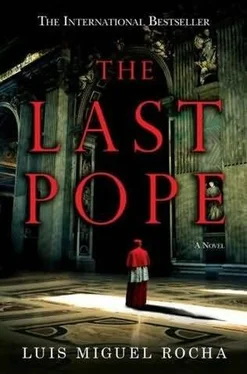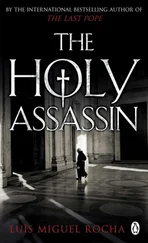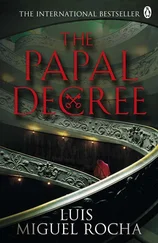Sister Vincenza had been here for over a month already, but she had not yet gotten used to the long, dark corridors. During the night hours only a wan illumination made objects scarcely visible appear threatening in the shadows. “It’s very uncomfortable, Don Albino, being unable to see even what one is carrying,” she had once told him.
The passing of centuries was reflected in every stone, every statue, and in the paintings and richly ornate tapestries hanging on the imposing walls. All this darkened splendor frightened Sister Vincenza. She almost screamed while passing by an unruly cherub she mistook for a child crouching down, ready for mischief. How silly of me! she told herself. No child had ever set foot in those corridors. The magnificence and lavishness of the Apostolic Palace were capable of disturbing the souls of the most sensitive people, and Sister Vincenza felt overwhelmed by such a spectacle of power and proximity to God. If it weren’t for Don Albino, she thought. If it weren’t for Don Albino, she would never have set foot in these galleries herself. Sister Vincenza tried to calm down. At such an early hour, these corridors were a source of fearful discomfort, but soon the new day would break and they would become thrilling again, vitally throbbing with the busy coming and going of secretaries, assistants, priests, and cardinals.
John Paul I had no shortage of advisers concerning protocol, politics, and even theology. Sister Vincenza, on the other hand, simply took care of Don Albino Luciani: of his food, his health, and the little inconveniences of daily life. Don Albino Luciani had only two people in whom to confide his concerns about the swelling of his feet or any other minor discomfort. Even though he had been told that in the Vatican there were specialized physicians that could take care of any complaint, Don Albino preferred to complain to Sister Vincenza, and to his favorite doctor, Giuseppe de Rós. Don Giuseppe came to Rome every two weeks, traveling almost four hundred miles to see his patient. “I don’t know how you do it, Don Albino,” the doctor said. “Are you sure you still have birthdays? Every year I find you healthier and hardier.”
“I’m beginning to doubt you, Don Giuseppe. You’re the only one who doesn’t notice my ailments.”
Vincenza carried out all her duties with humble pleasure. To her, Albino Luciani was a good man who treated her with gentleness and affection, more like a friend than a mere assistant. For that reason he had brought her with him upon moving into his new residence, considerably larger than the preceding one and much more sumptuous, of course. That magnificence and ostentation irritated Don Albino. He wasn’t a man who appreciated a profusion of useless objects. He was interested in spiritual issues. However, like everyone else, he sometimes had to deal with practical matters, if only to make life more livable for those around him. Albino knew that in time he would have to organize his home either to his taste or to that of others.
A heart attack less than a year ago had left Vincenza lying in a hospital bed. She didn’t heed her doctor’s advice not to go back to work, but just to supervise the work of others, and preferably sitting down. Instead, she continued to personally take care of Don Albino.
In spite of her kind disposition, Sister Vincenza frowned at the suggestion that she abandon the common chores she enjoyed doing, like bringing him that tray of coffee through the half-lit galleries so early in the morning. Of course, in order to keep doing them and to be near Don Albino, Sister Vincenza had to join the congregation of Maria Bambina, in charge of the pope’s residence. Elena, the mother superior, along with Sisters Margherita, Assunta Gabriella, and Clorinda, all had been very kind to her, but none of them wanted to be in charge of anything having to do with Don Albino’s daily matters. Only Sister Vincenza, with her skilled hands and delicate touch, was willing to take care of him. Usually when the nun reached the door of Don Albino’s private quarters, she set the tray on a small table placed there especially for this purpose, and gently knocked twice.
“Good morning, Don Albino,” she almost whispered. And she waited. A similar greeting would come from the other side of the door; Don Albino usually woke up in a good mood. Sometimes he stuck his head out to Sister Vincenza for his first smile of the day. Other times, when important Vatican business dampened his spirits, Don Albino mumbled his “good morning” and, to avoid complaining about the treasurers’ or politicians’ lack of diplomacy, lamented the swelling of his ankles.
But that morning, that morning, Don Albino kept silent. With Sister Vincenza’s fastidious penchant for precision, any departure from the daily routine annoyed her. She leaned her head on the door, straining to hear something on the other side. But she heard nothing. She considered knocking again, but finally decided against it. This is the first time Don Albino slept late, she thought as she was leaving. After all, it wouldn’t be such a tragedy if he slept a few more minutes.
Sister Vincenza silently walked back to her room to say her morning prayers.
It was already four-thirty in the morning.
MUTTERING THAT he couldn’t sleep, the man was tossing and turning in bed. This was so unusual. He had always been able to fall asleep anytime, anywhere, whatever the circumstances. Sergeant Hans Roggan was methodical, steady, reserved. His mother had come to Rome that day to visit him. He took her to dinner and it was probably the coffee he had with dessert, he thought, that was keeping him awake. At least that’s what Sergeant Hans wanted to believe, but in fact it had been a tumultuous day, the afternoon in particular, with many prelates coming and going in and out of the private quarters of His Holiness.
He finally decided to get up. If sleep won’t come, what can I do? I’m not going to lie here forever, waiting for it, he told himself. He opened his closet and put on his uniform, which had been designed in 1914 by Commandant Jules Repond. If Commander Repond had known then that decades later people would attribute his design to Michelangelo, who knows whether he would have enjoyed the honor or felt bitter about being ignored. On this cool night when Sergeant Hans Roggan couldn’t sleep, he was the one in charge of the Swiss Guard.
The vivid colors of his uniform, based on those in Michelangelo’s frescoes, contrasted with his mood on this day. He felt deeply uneasy, an inexplicable anxiety like a premonition. Such a concern, for the moment at least, seemed totally baseless.
Hans Roggan had his dream job, the one he had yearned for since his earliest years: to be serving the pope as part of the Swiss Guard. He had had to pass many tests and lead a very disciplined life, in strict adherence to the Lord’s teachings. Most important, though, he was graced with the basic requirements: being Swiss, unmarried, having the appropriate moral and ethical values, measuring more than five feet, nine inches tall, and above all, being Catholic.
Hans would never dishonor the image of the valiant soldiers of Pope Julius II. If need be, he was willing to die protecting his pope, as did the 689 Helvetian founders of the Swiss Guard, who, on the sixth of May 1527, protected Clement VII against a thousand Spanish and German soldiers during the sack of Rome. Only forty-two of them survived, but under Commandant Göldi, they had led the pope to safety in Castel Sant’Angelo. They took him through a secret passageway, the passetto, that linked the Vatican with the fort. The others perished heroically, but not before claiming the lives of almost eight hundred enemy invaders. That was the heritage Hans carried on his shoulders every time he wore his uniform, a pride that filled his soul every day. But today, for no apparent reason, he felt disturbed.
Читать дальше












